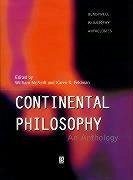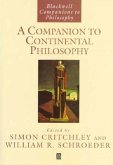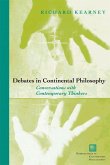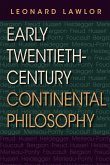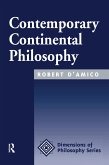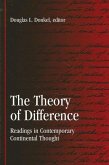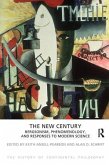Continental Philosophy
An Anthology
Herausgeber: Mcneill, William; Feldman, Karen S
Continental Philosophy
An Anthology
Herausgeber: Mcneill, William; Feldman, Karen S
- Gebundenes Buch
- Merkliste
- Auf die Merkliste
- Bewerten Bewerten
- Teilen
- Produkt teilen
- Produkterinnerung
- Produkterinnerung
From Immanuel Kant to Postmodernism, this volume provides an unparalleled student resource: a wide-ranging collection of the essential works of more than 50 seminal thinkers in modern European philosophy. Areas covered include Kant and German Idealism, Existentialism, Phenomenology, Hermeneutics, Marxism and the Frankfurt School, Structuralism, Psychoanalysis, Feminism, Deconstruction, and Postmodernism. Each section begins with a concise and helpful introduction, and all the texts have been selected for accessibility as well as significance, making the volume ideal for introductory and…mehr
Andere Kunden interessierten sich auch für
![A Companion to Continental Philosophy A Companion to Continental Philosophy]() A Companion to Continental Philosophy235,99 €
A Companion to Continental Philosophy235,99 €![The Blackwell Guide to Continental Philosophy The Blackwell Guide to Continental Philosophy]() Robert C Solomon / David Sherman (eds.)The Blackwell Guide to Continental Philosophy148,99 €
Robert C Solomon / David Sherman (eds.)The Blackwell Guide to Continental Philosophy148,99 €![Debates in Continental Philosophy: Conversations with Contemporary Thinkers Debates in Continental Philosophy: Conversations with Contemporary Thinkers]() Richard KearneyDebates in Continental Philosophy: Conversations with Contemporary Thinkers104,99 €
Richard KearneyDebates in Continental Philosophy: Conversations with Contemporary Thinkers104,99 €![Early Twentieth-Century Continental Philosophy Early Twentieth-Century Continental Philosophy]() Leonard LawlorEarly Twentieth-Century Continental Philosophy28,99 €
Leonard LawlorEarly Twentieth-Century Continental Philosophy28,99 €![Contemporary Continental Philosophy Contemporary Continental Philosophy]() Robert D'AmicoContemporary Continental Philosophy170,99 €
Robert D'AmicoContemporary Continental Philosophy170,99 €![The Theory of Difference: Readings in Contemporary Continental Thought The Theory of Difference: Readings in Contemporary Continental Thought]() The Theory of Difference: Readings in Contemporary Continental Thought99,99 €
The Theory of Difference: Readings in Contemporary Continental Thought99,99 €![The New Century The New Century]() Keith Ansell-PearsonThe New Century187,99 €
Keith Ansell-PearsonThe New Century187,99 €-
-
-
From Immanuel Kant to Postmodernism, this volume provides an unparalleled student resource: a wide-ranging collection of the essential works of more than 50 seminal thinkers in modern European philosophy. Areas covered include Kant and German Idealism, Existentialism, Phenomenology, Hermeneutics, Marxism and the Frankfurt School, Structuralism, Psychoanalysis, Feminism, Deconstruction, and Postmodernism. Each section begins with a concise and helpful introduction, and all the texts have been selected for accessibility as well as significance, making the volume ideal for introductory and advanced levels in philosophy, cultural studies, literary theory, and the history of modern thought.
Hinweis: Dieser Artikel kann nur an eine deutsche Lieferadresse ausgeliefert werden.
Hinweis: Dieser Artikel kann nur an eine deutsche Lieferadresse ausgeliefert werden.
Produktdetails
- Produktdetails
- Verlag: Wiley
- Seitenzahl: 480
- Erscheinungstermin: 8. Juni 1998
- Englisch
- Abmessung: 249mm x 172mm x 31mm
- Gewicht: 934g
- ISBN-13: 9781557867001
- ISBN-10: 1557867003
- Artikelnr.: 21557706
- Herstellerkennzeichnung
- Libri GmbH
- Europaallee 1
- 36244 Bad Hersfeld
- gpsr@libri.de
- Verlag: Wiley
- Seitenzahl: 480
- Erscheinungstermin: 8. Juni 1998
- Englisch
- Abmessung: 249mm x 172mm x 31mm
- Gewicht: 934g
- ISBN-13: 9781557867001
- ISBN-10: 1557867003
- Artikelnr.: 21557706
- Herstellerkennzeichnung
- Libri GmbH
- Europaallee 1
- 36244 Bad Hersfeld
- gpsr@libri.de
William McNeill, a well-known Heidegger translator and scholar, is Assistant professor of Philosophy at DePaul University. Karen S. Feldman is a PhD candidate in Philosophy at DePaul University.
Introduction.
Part I: The Age of the Systems: Kant and German Idealism.
1. Critique of Pure Reason (Immanuel Kant).
2. An Attempt at a New Presentation of the Wissenschaftslehre (Johann
Gottlieb Fichte).
3. Judgemant and Being (Friedrich Hölderlin).
4. The Oldest Program Towards a System in German Idealism).
5. Systems of Transcendental Idealism (Friedrich Wilhelm Joseph von
Schelling)6. Phenomenology of Spirit (Georg Wilhelm Friedrich Hegel).
Part II: Subjectivity in Question: Existentialism, Phenomenology, and
Hermeneutics.
1. The World as Will and Representation (Arthur Schopenhauer).
2. Either/or (Soren Kierkegaard).
3. The Gay Science; Twilight of the Idols; The Will to Power (Friedrich
Nietsche).
4. The Perception of Change (Henri Bergson).
5. Cartesian Mediatations (Edmund Husserl).
6. Being and Time (Martin Heidegger).
7. Man's Place in Nature (Max Scheler).
8. Philosophy of Existence (Karl Jaspers).
9. Introduction to the Reading of Hegel (Alexandre Kojève).
10. Being and Nothingness (Jean-Paul Sartre).
11. The Second Sex (Simone de Beauvoir).
12. The Visible and the Invisible (Maurice Merleau-Ponty).
13. The Trace of the Other (Emmanuel Levinas).
14. The Universality of the Hermeneutical Problem (Hans-Georg Gadamer).
15. Metaphor and the Central Problem of Hermeneutics (Paul Ricoeur).
Part III: Political Thought: Marxism and Critical Theory.
1. The Philosophy of Right (Georg Wilhelm Friedrich Hegel).
2. Alienated Labor: The German Ideology (Karl Marx and Friedrich Engels).
3. Democracy and Dictatorship (Rosa Luxembourg).
4. History and Class Consciousness (Georg Lukacs).
5. What is a Man (Antonio Gramsci).
6. The Work of Art in the Age of Mechanical Reproduction (Walter Benjamin).
7. Dialectic of Enlightenment (Theodor Adorno and Max Horkheimer).
8. The Human Condition (Hannah Arendt).
9. For Marx (Louis Althusser).
10. One-Dimensional Man (Herbert Marcuse).
11. Knowledge and Human Interests (Jürgen Habermas).
Part VI: Structuralism and Psychoanalysis.
1. Course in General Linguistics (Ferdinand de Saussure).
2. The Elementary Structures of Kinship (Claude Lévi-Strauss).
3. The Structuralist Activity (Roland Barthes).
4. Beyond the Pleasure Principle; Femininity (Sigmund Freud).
5. The Mirror Stage; The Significance of the Phallus (Jacques Lacan).
Part V: Deconstruction, Feminism, and Postmodernism.
1. The Use Value of D. A. F. de Sade (Georges Bataille).
2. The Space of Literature (Maurice Blanchot).
3. Of Grammatology (Jacques Derrida).
4. Anti-Oedipus: Capitalism and Schizophrenia (Gilles Deleuze and Félix
Guattari).
5. Sorties: Out and Out: Attacks/ Ways Out/ Forays (Hélène Cixous).
6. The History of Sexuality (Michel Foucault).
7. The Post-Modern Condition: A Report on Knowledge (Jean-François
Lyotard).
8. Women's Time (Julia Kristeva).
9. The Enigma of Woman (Sarah Kofman).
10. Sexual Difference (Luce Irigaray).
11. The Inoperative Community (Jean-Luc Nancy).
12. The Ecstasy of Communication (Jean Baudrillard).
13. The Nation-Thing (Slavoj Zizek).
Index.
Part I: The Age of the Systems: Kant and German Idealism.
1. Critique of Pure Reason (Immanuel Kant).
2. An Attempt at a New Presentation of the Wissenschaftslehre (Johann
Gottlieb Fichte).
3. Judgemant and Being (Friedrich Hölderlin).
4. The Oldest Program Towards a System in German Idealism).
5. Systems of Transcendental Idealism (Friedrich Wilhelm Joseph von
Schelling)6. Phenomenology of Spirit (Georg Wilhelm Friedrich Hegel).
Part II: Subjectivity in Question: Existentialism, Phenomenology, and
Hermeneutics.
1. The World as Will and Representation (Arthur Schopenhauer).
2. Either/or (Soren Kierkegaard).
3. The Gay Science; Twilight of the Idols; The Will to Power (Friedrich
Nietsche).
4. The Perception of Change (Henri Bergson).
5. Cartesian Mediatations (Edmund Husserl).
6. Being and Time (Martin Heidegger).
7. Man's Place in Nature (Max Scheler).
8. Philosophy of Existence (Karl Jaspers).
9. Introduction to the Reading of Hegel (Alexandre Kojève).
10. Being and Nothingness (Jean-Paul Sartre).
11. The Second Sex (Simone de Beauvoir).
12. The Visible and the Invisible (Maurice Merleau-Ponty).
13. The Trace of the Other (Emmanuel Levinas).
14. The Universality of the Hermeneutical Problem (Hans-Georg Gadamer).
15. Metaphor and the Central Problem of Hermeneutics (Paul Ricoeur).
Part III: Political Thought: Marxism and Critical Theory.
1. The Philosophy of Right (Georg Wilhelm Friedrich Hegel).
2. Alienated Labor: The German Ideology (Karl Marx and Friedrich Engels).
3. Democracy and Dictatorship (Rosa Luxembourg).
4. History and Class Consciousness (Georg Lukacs).
5. What is a Man (Antonio Gramsci).
6. The Work of Art in the Age of Mechanical Reproduction (Walter Benjamin).
7. Dialectic of Enlightenment (Theodor Adorno and Max Horkheimer).
8. The Human Condition (Hannah Arendt).
9. For Marx (Louis Althusser).
10. One-Dimensional Man (Herbert Marcuse).
11. Knowledge and Human Interests (Jürgen Habermas).
Part VI: Structuralism and Psychoanalysis.
1. Course in General Linguistics (Ferdinand de Saussure).
2. The Elementary Structures of Kinship (Claude Lévi-Strauss).
3. The Structuralist Activity (Roland Barthes).
4. Beyond the Pleasure Principle; Femininity (Sigmund Freud).
5. The Mirror Stage; The Significance of the Phallus (Jacques Lacan).
Part V: Deconstruction, Feminism, and Postmodernism.
1. The Use Value of D. A. F. de Sade (Georges Bataille).
2. The Space of Literature (Maurice Blanchot).
3. Of Grammatology (Jacques Derrida).
4. Anti-Oedipus: Capitalism and Schizophrenia (Gilles Deleuze and Félix
Guattari).
5. Sorties: Out and Out: Attacks/ Ways Out/ Forays (Hélène Cixous).
6. The History of Sexuality (Michel Foucault).
7. The Post-Modern Condition: A Report on Knowledge (Jean-François
Lyotard).
8. Women's Time (Julia Kristeva).
9. The Enigma of Woman (Sarah Kofman).
10. Sexual Difference (Luce Irigaray).
11. The Inoperative Community (Jean-Luc Nancy).
12. The Ecstasy of Communication (Jean Baudrillard).
13. The Nation-Thing (Slavoj Zizek).
Index.
Introduction.
Part I: The Age of the Systems: Kant and German Idealism.
1. Critique of Pure Reason (Immanuel Kant).
2. An Attempt at a New Presentation of the Wissenschaftslehre (Johann
Gottlieb Fichte).
3. Judgemant and Being (Friedrich Hölderlin).
4. The Oldest Program Towards a System in German Idealism).
5. Systems of Transcendental Idealism (Friedrich Wilhelm Joseph von
Schelling)6. Phenomenology of Spirit (Georg Wilhelm Friedrich Hegel).
Part II: Subjectivity in Question: Existentialism, Phenomenology, and
Hermeneutics.
1. The World as Will and Representation (Arthur Schopenhauer).
2. Either/or (Soren Kierkegaard).
3. The Gay Science; Twilight of the Idols; The Will to Power (Friedrich
Nietsche).
4. The Perception of Change (Henri Bergson).
5. Cartesian Mediatations (Edmund Husserl).
6. Being and Time (Martin Heidegger).
7. Man's Place in Nature (Max Scheler).
8. Philosophy of Existence (Karl Jaspers).
9. Introduction to the Reading of Hegel (Alexandre Kojève).
10. Being and Nothingness (Jean-Paul Sartre).
11. The Second Sex (Simone de Beauvoir).
12. The Visible and the Invisible (Maurice Merleau-Ponty).
13. The Trace of the Other (Emmanuel Levinas).
14. The Universality of the Hermeneutical Problem (Hans-Georg Gadamer).
15. Metaphor and the Central Problem of Hermeneutics (Paul Ricoeur).
Part III: Political Thought: Marxism and Critical Theory.
1. The Philosophy of Right (Georg Wilhelm Friedrich Hegel).
2. Alienated Labor: The German Ideology (Karl Marx and Friedrich Engels).
3. Democracy and Dictatorship (Rosa Luxembourg).
4. History and Class Consciousness (Georg Lukacs).
5. What is a Man (Antonio Gramsci).
6. The Work of Art in the Age of Mechanical Reproduction (Walter Benjamin).
7. Dialectic of Enlightenment (Theodor Adorno and Max Horkheimer).
8. The Human Condition (Hannah Arendt).
9. For Marx (Louis Althusser).
10. One-Dimensional Man (Herbert Marcuse).
11. Knowledge and Human Interests (Jürgen Habermas).
Part VI: Structuralism and Psychoanalysis.
1. Course in General Linguistics (Ferdinand de Saussure).
2. The Elementary Structures of Kinship (Claude Lévi-Strauss).
3. The Structuralist Activity (Roland Barthes).
4. Beyond the Pleasure Principle; Femininity (Sigmund Freud).
5. The Mirror Stage; The Significance of the Phallus (Jacques Lacan).
Part V: Deconstruction, Feminism, and Postmodernism.
1. The Use Value of D. A. F. de Sade (Georges Bataille).
2. The Space of Literature (Maurice Blanchot).
3. Of Grammatology (Jacques Derrida).
4. Anti-Oedipus: Capitalism and Schizophrenia (Gilles Deleuze and Félix
Guattari).
5. Sorties: Out and Out: Attacks/ Ways Out/ Forays (Hélène Cixous).
6. The History of Sexuality (Michel Foucault).
7. The Post-Modern Condition: A Report on Knowledge (Jean-François
Lyotard).
8. Women's Time (Julia Kristeva).
9. The Enigma of Woman (Sarah Kofman).
10. Sexual Difference (Luce Irigaray).
11. The Inoperative Community (Jean-Luc Nancy).
12. The Ecstasy of Communication (Jean Baudrillard).
13. The Nation-Thing (Slavoj Zizek).
Index.
Part I: The Age of the Systems: Kant and German Idealism.
1. Critique of Pure Reason (Immanuel Kant).
2. An Attempt at a New Presentation of the Wissenschaftslehre (Johann
Gottlieb Fichte).
3. Judgemant and Being (Friedrich Hölderlin).
4. The Oldest Program Towards a System in German Idealism).
5. Systems of Transcendental Idealism (Friedrich Wilhelm Joseph von
Schelling)6. Phenomenology of Spirit (Georg Wilhelm Friedrich Hegel).
Part II: Subjectivity in Question: Existentialism, Phenomenology, and
Hermeneutics.
1. The World as Will and Representation (Arthur Schopenhauer).
2. Either/or (Soren Kierkegaard).
3. The Gay Science; Twilight of the Idols; The Will to Power (Friedrich
Nietsche).
4. The Perception of Change (Henri Bergson).
5. Cartesian Mediatations (Edmund Husserl).
6. Being and Time (Martin Heidegger).
7. Man's Place in Nature (Max Scheler).
8. Philosophy of Existence (Karl Jaspers).
9. Introduction to the Reading of Hegel (Alexandre Kojève).
10. Being and Nothingness (Jean-Paul Sartre).
11. The Second Sex (Simone de Beauvoir).
12. The Visible and the Invisible (Maurice Merleau-Ponty).
13. The Trace of the Other (Emmanuel Levinas).
14. The Universality of the Hermeneutical Problem (Hans-Georg Gadamer).
15. Metaphor and the Central Problem of Hermeneutics (Paul Ricoeur).
Part III: Political Thought: Marxism and Critical Theory.
1. The Philosophy of Right (Georg Wilhelm Friedrich Hegel).
2. Alienated Labor: The German Ideology (Karl Marx and Friedrich Engels).
3. Democracy and Dictatorship (Rosa Luxembourg).
4. History and Class Consciousness (Georg Lukacs).
5. What is a Man (Antonio Gramsci).
6. The Work of Art in the Age of Mechanical Reproduction (Walter Benjamin).
7. Dialectic of Enlightenment (Theodor Adorno and Max Horkheimer).
8. The Human Condition (Hannah Arendt).
9. For Marx (Louis Althusser).
10. One-Dimensional Man (Herbert Marcuse).
11. Knowledge and Human Interests (Jürgen Habermas).
Part VI: Structuralism and Psychoanalysis.
1. Course in General Linguistics (Ferdinand de Saussure).
2. The Elementary Structures of Kinship (Claude Lévi-Strauss).
3. The Structuralist Activity (Roland Barthes).
4. Beyond the Pleasure Principle; Femininity (Sigmund Freud).
5. The Mirror Stage; The Significance of the Phallus (Jacques Lacan).
Part V: Deconstruction, Feminism, and Postmodernism.
1. The Use Value of D. A. F. de Sade (Georges Bataille).
2. The Space of Literature (Maurice Blanchot).
3. Of Grammatology (Jacques Derrida).
4. Anti-Oedipus: Capitalism and Schizophrenia (Gilles Deleuze and Félix
Guattari).
5. Sorties: Out and Out: Attacks/ Ways Out/ Forays (Hélène Cixous).
6. The History of Sexuality (Michel Foucault).
7. The Post-Modern Condition: A Report on Knowledge (Jean-François
Lyotard).
8. Women's Time (Julia Kristeva).
9. The Enigma of Woman (Sarah Kofman).
10. Sexual Difference (Luce Irigaray).
11. The Inoperative Community (Jean-Luc Nancy).
12. The Ecstasy of Communication (Jean Baudrillard).
13. The Nation-Thing (Slavoj Zizek).
Index.

